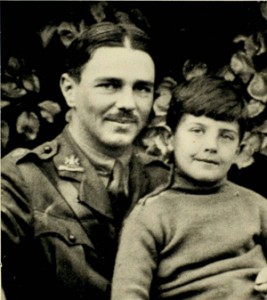Owen’s Untimely Death January 31, 2012
Author: Beach Combing | in : Contemporary , trackback
There are occasional micro moments in history that are so extraordinary painful to read about that they strangely dwarf greater tragedies such as the liquidation of a ghetto, the dropping of an atom bomb or the sinking of a cruise-liner. One of these micro tragedies that has been bobbing in and out of Beachcombing’s consciousness in the last 24 hours is the appalling death of Wilfred Owen in the First World War. Not ‘appalling’ because Owen suffered particularly – he seems to have died mercifully in a hail of machine gun bullets – but ‘appalling’ because of its timing.
For those who might not know him Wilfred Owen was the greatest English-speaking poet to come out of the First World War. He was only twenty three when he went up to the front and he was twenty five when the war ended and yet he attained a maturity in his works that was denied to many older contemporaries. He also showed signs of ‘stretch’ that others like Sassoon and perhaps even Graves did not have. After the war he was destined to write other works with other themes and to have wrought his world in rhyme. He should have been one of the greatest English-speaking poets of the Edwardian age and perhaps of the century.
Owen first served in 1916 and eventually was returned to Britain suffering from shell shock after several traumatic experiences. (He was lucky to have survived these). He went back out, however, to the front and was ‘in at the kill’ in those dramatic last two weeks before the Armistice when British and Dominion troops rolled up the German lines completing the work that the Italians had begun at Vittorio Veneto.
On 11 November 1918, the German finally signed the armistice and Owen’s parents, devout Anglicans, listened to the bells in Shrewsbury ringing out to pronounce the end of the war. Susan, his mother will have likely give thanks, in prayer, for the miracle that her four children had made it through their Gomorrah alive: something given to very few families, especially those with three boys – all the pent up anxiety of five years rushing out of her. Then zingggggg. The doorbell rang and the Owen family learnt, in their moment of relief, that their Wilfred had been killed.
Owen had actually died a week before on the Manchesters’ legendary attack on the Sambre-Oise canal, and Britain’s angels of death took time to inform families. Just a couple of days before this attack he had written to his mother: ‘I hope you are as warm as I am, soothed in your room as I am here. I am certain you could not be visited by a band of friends half so fine as surround us here. There is no danger down here, or if any, it will be well over before you read these lines…’ Owen, of course, knew that the war was almost over.
There is something, at times, almost sadistic about the peculiar rhythms of life that make one want to reach out and give the divinity a good slapping: ‘As flies to wanton boys are we to the gods they kill us for their sport.’
Any other deaths in the moment of victory: drbeachcombing AT yahoo DOT com
***
3 Feb 2012: Several names came up for death at the moment of victory including (again and again) Nelson. M. Zach, the grand old partisan gave Horatio Nelson, Yonatan Netanyahu and Abraham Lincoln. SY gave Wolfe at Quebec in 1759. Thanks SY and MZ!



